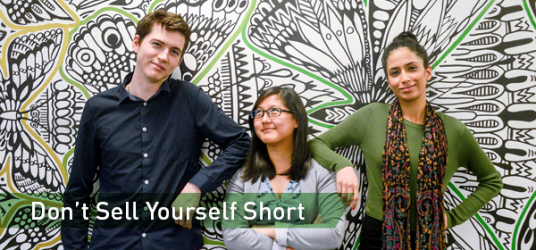
When I was in high school applying for university, my teachers often told me that even if I didn’t know what I wanted to do now, I’d figure it out when I was in university. Three years into post-secondary and going into my third co-op term, I can safely say this:
I have no idea what I’m doing.
That’s right, university is not the fabled be-all and end-all of your career path. And that’s not necessarily a bad thing. When I was in high school, I wanted to be a doctor. I was accepted into Pre-med and thought I was set for the rest of my life. First year of university, I ended up as a Communication major here at SFU. Second year, I was making arrangements to transfer to SIAT and became a professional photographer working for CBC Campus. Third year, I decided to stay in Communications and took on a more writing based role in the BC Tech Industry here at Allocadia.
Throughout my university career, I’ve been a writer, designer, photographer, videographer, marketer, social media coordinator, event planner and more. Instead of finding my dream career, all I’ve found is that I’m incredibly confused. And that’s ok.
Personally, and I feel many of my peers would also agree, I think that there’s so much pressure to figure out the rest of your life by the time you graduate. The day right before my co-op site visit, I freaked out. I knew that I would be asked what my future plans were and I hadn’t so much as given it a thought. The reality that I was two semesters away from graduating hit me hard and sent me into panic. I went around my entire company asking people for advice and what they had wanted to be in university, just to get some sort of idea of what I should be aiming for. The answer, of course, varied from person to person. Long story short, it’s not possible to plan out the rest of your life.
Working in the Tech industry and listening to my colleagues’ experiences has showed me that nothing is definite, the career you want now may not even exist in the future or evolve into something completely different.
What you should be learning in university is not what you want to do for the rest of your life. You should be learning about yourself. When I first applied for Allocadia, I had no idea what I was getting into. I didn’t know anything about the Tech Industry or the product itself. It was a giant risk that I took, venturing into an industry that I knew nothing, but it was a risk that paid off. 3 months into my co-op, I’ve learned what my strengths and weaknesses are and how to address them, I’ve picked up skills that would be versatile in any environment like writing, project management, how to be adaptable and more.
I love my job, but is this what I want to do for the rest of my life? Who knows. I took this job thinking it was going to help me find my be-all and end-all, but instead I’ve learned that it’s not important to know your be-all, end-all. I’ve learned that I like jobs that keep me busy and work best in an environment where I wear many hats in my role. I’ve learned that finding what type of work I like to do and what type of environment I like to work in was way more important than finding my “one true career”. This isn’t something that I would have been able to learn about myself if I hadn’t done co-op.
Sometimes the tides shift and you don’t know where you’re going to end up. Go with it, because as cheesy and cliché as it sounds, the journey is definitely more important than the outcome. If you told me three years ago that I wouldn’t be a doctor, and that instead I’d be going to university in Canada, I’d say that you were insane. Your experiences that cultivate your personal and professional growth are what’s important, and I wouldn’t trade them for the world.














